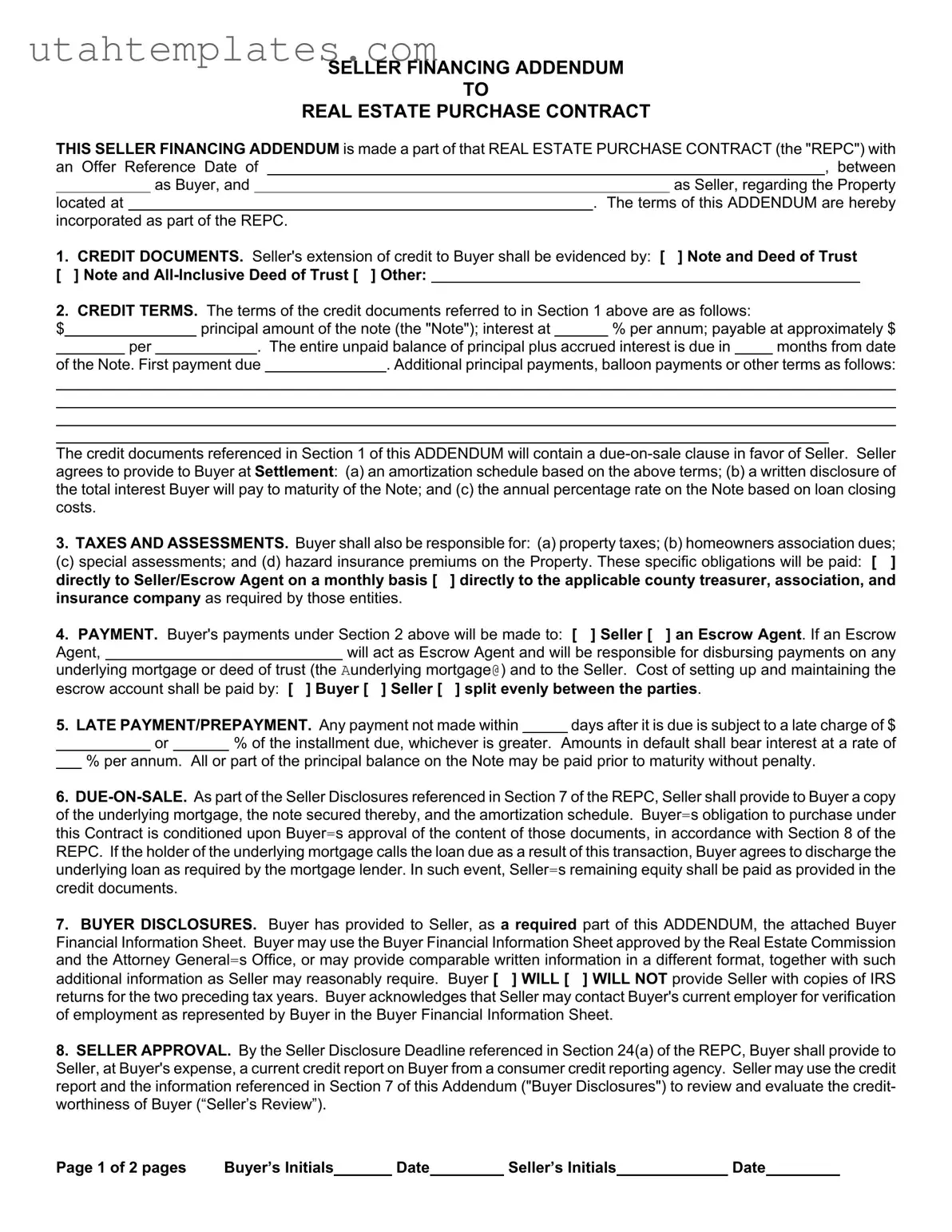SELLER FINANCING ADDENDUM
TO
REAL ESTATE PURCHASE CONTRACT
THIS SELLER FINANCING ADDENDUM is made a part of that REAL ESTATE PURCHASE CONTRACT (the "REPC") with
|
|
|
|
|
|
|
|
an Offer Reference Date of |
|
|
|
, between |
|
|
as Buyer, and |
|
|
as Seller, regarding the Property |
located at |
|
. The terms of this ADDENDUM are hereby |
incorporated as part of the REPC. |
|
|
|
1. CREDIT DOCUMENTS. Seller's extension of credit to Buyer shall be evidenced by: [ ] Note and Deed of Trust [ ] Note and All-Inclusive Deed of Trust [ ] Other:
2.CREDIT TERMS. The terms of the credit documents referred to in Section 1 above are as follows:
$ |
|
|
principal amount of the note (the "Note"); interest at |
|
% per annum; payable at approximately $ |
|
|
|
|
|
|
|
|
|
|
|
|
|
|
per |
|
|
. The entire unpaid balance of principal plus accrued interest is due in |
|
months from date |
of the Note. First payment due |
|
. Additional principal payments, balloon payments or other terms as follows: |
|
|
|
|
|
|
|
|
|
|
|
|
|
|
|
|
|
|
|
|
|
|
|
|
|
|
|
|
|
|
|
|
|
|
|
|
|
|
|
|
|
|
|
|
|
|
|
|
|
|
|
|
The credit documents referenced in Section 1 of this ADDENDUM will contain a due-on-sale clause in favor of Seller. Seller agrees to provide to Buyer at Settlement: (a) an amortization schedule based on the above terms; (b) a written disclosure of the total interest Buyer will pay to maturity of the Note; and (c) the annual percentage rate on the Note based on loan closing costs.
3.TAXES AND ASSESSMENTS. Buyer shall also be responsible for: (a) property taxes; (b) homeowners association dues;
(c) special assessments; and (d) hazard insurance premiums on the Property. These specific obligations will be paid: [ ] directly to Seller/Escrow Agent on a monthly basis [ ] directly to the applicable county treasurer, association, and insurance company as required by those entities.
4. PAYMENT. Buyer's payments under Section 2 above will be made to: [ ] Seller [ ] an Escrow Agent. If an Escrow
Agent,will act as Escrow Agent and will be responsible for disbursing payments on any
underlying mortgage or deed of trust (the Aunderlying mortgage@) and to the Seller. Cost of setting up and maintaining the escrow account shall be paid by: [ ] Buyer [ ] Seller [ ] split evenly between the parties.
|
|
|
|
|
|
|
5. LATE PAYMENT/PREPAYMENT. Any payment not made within |
|
|
days after it is due is subject to a late charge of $ |
|
or |
|
% of the installment due, whichever is greater. |
Amounts in default shall bear interest at a rate of |
%per annum. All or part of the principal balance on the Note may be paid prior to maturity without penalty.
6.DUE-ON-SALE. As part of the Seller Disclosures referenced in Section 7 of the REPC, Seller shall provide to Buyer a copy of the underlying mortgage, the note secured thereby, and the amortization schedule. Buyer=s obligation to purchase under this Contract is conditioned upon Buyer=s approval of the content of those documents, in accordance with Section 8 of the REPC. If the holder of the underlying mortgage calls the loan due as a result of this transaction, Buyer agrees to discharge the underlying loan as required by the mortgage lender. In such event, Seller=s remaining equity shall be paid as provided in the credit documents.
7.BUYER DISCLOSURES. Buyer has provided to Seller, as a required part of this ADDENDUM, the attached Buyer Financial Information Sheet. Buyer may use the Buyer Financial Information Sheet approved by the Real Estate Commission and the Attorney General=s Office, or may provide comparable written information in a different format, together with such
additional information as Seller may reasonably require. Buyer [ ] WILL [ ] WILL NOT provide Seller with copies of IRS returns for the two preceding tax years. Buyer acknowledges that Seller may contact Buyer's current employer for verification of employment as represented by Buyer in the Buyer Financial Information Sheet.
8.SELLER APPROVAL. By the Seller Disclosure Deadline referenced in Section 24(a) of the REPC, Buyer shall provide to Seller, at Buyer's expense, a current credit report on Buyer from a consumer credit reporting agency. Seller may use the credit report and the information referenced in Section 7 of this Addendum ("Buyer Disclosures") to review and evaluate the credit- worthiness of Buyer (“Seller’s Review”).



